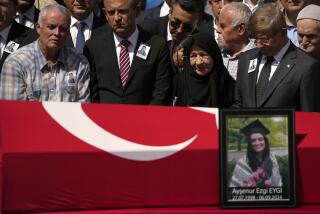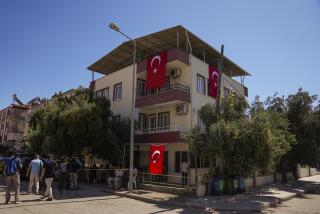Far-left group says it bombed U.S. Embassy in Turkey
BEIRUT — An outlawed far-left group that accuses the Turkish government of doing Washington’s bidding in Syria and elsewhere claimed responsibility Saturday for the suicide attack on the U.S. Embassy in Ankara.
The Revolutionary People’s Liberation Party-Front made the claim in a statement posted on a website linked to the group, according to news reports.
The group, known by its Turkish initials DHKP-C, said the bombing Friday was in retaliation for U.S. policy in the Middle East, Turkish public broadcaster TRT reported
The United States and Turkey are close allies and fellow members of the North Atlantic Treaty Organization.
Some Turkish leftists allege that U.S. pressure is behind Turkey’s robust support for the uprising in neighboring Syria against the government of President Bashar Assad. Turkish authorities deny taking direction from Washington and call Assad a dictator who has lost credibility by turning his military loose on his own citizens.
The DHKP-C was cited as the main suspect a few hours after a suicide bomber linked to the group blew himself up outside the U.S. Embassy. The blast killed a guard and critically injured a Turkish journalist who was entering the compound to visit the U.S. ambassador.
No U.S. personnel were seriously injured in the explosion, which heavily damaged an entrance to the mission but left the main embassy building unscathed, officials said. The State Department said strict security procedures probably had saved lives, preventing the attacker from getting inside the embassy grounds.
Turkish news agencies reported that authorities had arrested three people in connection with the bombing. Their suspected roles were not known.
The attacker, dressed like a courier and carrying an envelope, was recorded by security cameras as he walked toward the embassy entrance shortly before detonating his explosives, according to video posted online by the semiofficial Anadolu news agency.
Authorities identified the assailant as Ecevit Sanli, 40, a member of the DHKP-C who had served prison time for a 1997 flame-thrower attack on military guest house in Istanbul, Turkish news reports said. He was released in 2001, apparently because of ill health, and fled the country. He reentered Turkey illegally with a fake ID, Interior Minister Muammer Guler told reporters.
A photo purportedly of Sanli circulating on the Internet shows a beret-wearing, 1970s-style figure brandishing a rifle and standing defiantly in front of a pair of revolutionary banners, one emblazoned with the Communist hammer and sickle.
The embassy attacker was carrying 13 pounds of TNT that he set off with an electronic detonator, Turkish authorities said. A grenade in his possession also exploded, they said.
The DHKP-C, though little known outside Turkey, is regarded as a terrorist organization by Washington and Ankara.
The group has been implicated in attacks dating back decades, including several on U.S. targets, officials said. But the DHKP-C is low-profile compared with militant Islamic and ethnic Kurdish factions that have been linked to spectacular bombings and other strikes on Turkish territory in recent years.
The Turkish news media have reported a recent increase in the number of attacks attributed to the DHKP-C, including several killings of Turkish police officers. Last month, Turkish police arrested several dozen people suspected of having links to the group, according to news reports.
Some analysts in Turkey speculate that the bombing Friday may have been in response to U.S. and Turkish support for the Syrian revolt against Assad. But Turkish Prime Minister Recep Tayyip Erdogan told reporters Friday that he did not think the attack had anything to do with his government’s strong anti-Assad stance.
The U.S. flag at the embassy in Ankara was at half-staff Saturday in a sign of mourning for the slain Turkish security guard, Mustafa Akarsu, 46, a father of two. U.S. Ambassador Francis J. Ricciardone and other embassy officials attended Akarsu’s funeral.
More to Read
Sign up for Essential California
The most important California stories and recommendations in your inbox every morning.
You may occasionally receive promotional content from the Los Angeles Times.









